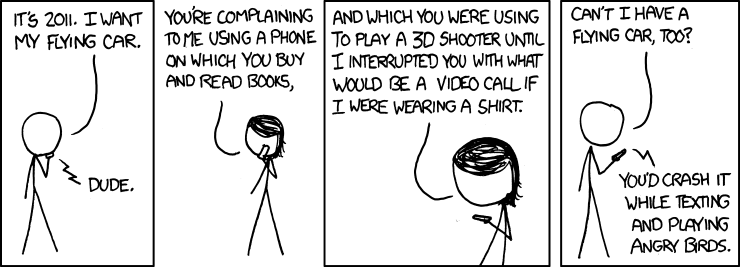- NASA wasted over $400 million taxpayer dollars last week as its new global warming research satellite (I thought the science was settled?) failed to make it onto orbit. The cause? A rocket “glitch.” That’s the second time in two years. Just abolish the agency and myriad regulations already to make way for private space endeavors.
- A recent episode (S2Ep17) of the tv series Community mocks politics and student government elections, that training ground for our future rulers. You might want to watch it on Hulu.com, while it’s still available, before reading the rest of this entry as I picked out my favorite parts to highlight and they might spoil it for you.
Britta, the same character concerned with orc/goblin (I forget) property rights in the AD&D episode, declares that democracy (rule by the people ) is a sham and that human beings should not be governed. But she’s not well-received by the masses. Pierce (Chevy Chase) enters the race simply to harass a fellow candidate for not loaning him her pencil earlier. Jeff enters simply to demonstrate to the lone serious candidate, Annie, who comes off as a typical hyper-competitive douchebag, that he can beat her simply by uttering empty feel-good slogans, prompting her to turn to dirty politics in order to embarrass him into pulling out of the race. There are several other joke candidates as well. Good stuff.
Geoffrey Allan Plauché
NEWS ROUNDUP | NASA FAIL, Community Mocks Politics, Cheap eBooks, D&D, History of SF
in Fantasy Fiction, Games, Humor, News, Science Fiction, TV

Help Promote Prometheus Unbound by Sharing this Post
EDITORIAL | The Perils and Importance of Futurism and Science-Fictional Speculation
in Editorials, Featured Posts, Humor, Science Fiction, Statism, Technology

When you make predictions about the future, there is a good chance that you’ll be wrong. People have a tendency to grow attached to certain visions of the future and become so jaded by its failure to materialize that they are blind to the technological wonders that actually are materializing around them. Some even take this attitude to an extreme that resembles making the perfect the enemy of the good.” They become so obsessed with their ideal vision of the future that they lose all other perspective; they look back and can evaluate what they already have only in light of this perfect vision, compared to which everything else is shit: worthless and unenjoyable. They can’t be happy with what they have now.
A recent xkcd comic illustrates these points well:
The flying car and the personal jetpack were popular dreamed-of products in the last century. I remember That 70’s Show episodes in which the father, Red Foreman, complained about lacking the flying cars that his generation had been promised and daydreamed about having a robot servant and a personal jetpack. There’s even a band called We Were Promised Jetpacks. Gizmodo has a list of 10 technologies we were promised and never got. As if to underscore my point and the xkcd comic, the title of the post is 100 Years of Failure.
Help Promote Prometheus Unbound by Sharing this Post
BREAKING NEWS | “Defense” Secretary Gates Rediscovers Most Famous Classic Blunder
in Fantasy Fiction, Film, News, Novels, Statism
With great solemnity, “Defense” Secretary Robert Gates imparted on West Point cadets this Friday a hard-earned pearl of newly discovered wisdom:
“In my opinion, any future defense secretary who advises the president to again send a big American land army into Asia or into the Middle East or Africa should ‘have his head examined,’ as General MacArthur so delicately put it,” Mr. Gates told an assembly of Army cadets here.
In other words, “Never get involved in a land war in Asia.”
Sounds like good advi… Wait,what? Not everyone knows this already? Inconceivable!
Any culturally literate person has seen The Princess Bride at least once in the last 24 years1 and certainly knows about the most famous classic blunder:
Help Promote Prometheus Unbound by Sharing this Post
NEWS ROUNDUP | The Last Ringbearer, Analog Magazine eSubmissions, More Atlas Shrugged, Sucker Punch, Game of Thrones
in Fantasy Fiction, Film, Magazines, News, Novels, Science Fiction, TV
Lots of news to catch up on with this post.
- Over a decade ago, a Russian paleontologist wrote an alternative take on the War of the Ring from J.R.R. Tolkien’s The Lord of the Rings. Recently translated into English, Kirill Yeskov’s The Last Ringbearer tells the tale from the point of view of Mordor, the bad guys in Tolkien’s epic.
History is usually written by the victors, but now the truth of the War of the Ring has finally come out. Gandalf is portrayed as a warmonger bent on destroying a bastion of civilization dedicated to reason, science, technology, and industrialization because science “destroys the harmony of the world and dries up the souls of men!” The elves are bent on world domination and Aragorn is a Machiavellian schemer whose strings are pulled by his wife, Arwen.
If you’re intrigued, you can learn more about The Last Ringbearer from the Salon.com article “Middle-Earth according to Mordor” and, also on Salon.com, the author’s own account of why he wrote the novel. You can download The Last Ringbearer for free and give it a read. Here’s to hoping Christopher Tolkien doesn’t aggress against Yeskov by launching a copyright or trademark infringement lawsuit. - Finally, the print magazine, Analog Science Fiction and Fact, is entering the digital age and switching from snail mail to an electronic submissions system.
- In my previous news roundup, I posted the trailer of the upcoming movie adaptation of Ayn Rand’s Atlas Shrugged as well as some reports from people who had seen an advance preview and an interview with the producer. Here’s more footage, the scene in which Henry Rearden returns home and gives his wife a bracelet made from the first pouring of Rearden Metal:
[continue reading…]
Help Promote Prometheus Unbound by Sharing this Post

I didn’t like Makers. I wanted to like it. Cory Doctorow, the author, is a cool geek and something of an ally in the struggle against intellectual property, i.e., government grants of monopoly privilege. But overall I just did not enjoy the book for a number of reasons.
To be sure, there are things to like about Makers. If you’re an avid reader of Boing Boing, you might like it. I only dip my toes in occasionally. Reading Makers is a lot like reading Boing Boing in novel form. Cory excels at imagining interesting gadgets and cool new uses for current and upcoming technology — the kind of geeky tech and pop culture things he and his fellow bloggers share on Boing Boing all the time, only some unspecified number of years into the near near future. The book will probably date quickly, but this aspect of it was fun…for a while. When it comes to things, Cory has an expansive imagination and a deep understanding. When it comes to people and plotting, on the other hand, his imagination and understanding seem to me to be more limited.
Makers started out as a novella titled Themepunks, serialized on Salon.com, though it appears Cory envisioned it from the beginning as merely the first part of a novel. I wish he hadn’t. Makers consists of three parts and an epilogue, with Themepunks being part one, the first 100 or so pages. Like Luke Burrage, I enjoyed part one, for the most part, but thought the novel went downhill from there.
As the novel opens we are introduced to the first main viewpoint character, a tech reporter by the name of Suzanne Church (Andrea Fleeks in Themepunks1). Suzanne attends a press conference held by the new CEO of Kodak/Duracell (or Kodacell), Landon Kettlewell. Kodak and Duracell are struggling companies in the near future. There’s no longer a need or market for their products. I guess they failed to innovate and remain competitive in a changing technological landscape. Kodak I can see. But Duracell? People won’t need batteries in the future? Duracell will fail to develop new power cells for new products? Really? In any case, Kettlewell and his financial backers decide to buy and merge Kodak and Duracell and then essentially gut them. The idea is apparently to trade on the old companies’ good brand names and use their capital to back a creative new business model.
Under Kettlewell, Kodacell becomes a kind of Grameen Bank of venture capital, engaging in micro-financing of garage-next-door would-be inventors and entrepreneurs. The business plan is for Kodacell to find untapped creative geniuses throughout the country, provide them with funding and a business manager, and act as the central coordinator in a distributed network of small, independent teams. A pretty nifty idea. This relatively non-hierarchical business model, the focus on 3-D printers, and a number of other aspects of the novel will be appealing to many left-libertarians, I think.
Suzanne then takes on the role of embedded journalist and later blogger when she travels to Florida to follow Kettlewell’s star makers, two young guys named Perry and Lester. She befriends them and reports on what they’re doing and on their relationship with a resourceful local squatter community (another thing left-libertarians and off-the-grid survivalists will probably like). Thanks in large part to her reporting a new worldwide movement is spawned and later dubbed the New Work (too New Deal-esque, for my taste, but at least it was a voluntary private initiative). Kodacell quickly attracts imitators and the new venture micro-capital market is soon unsustainably flooded with an excess of money, credit, and competitors. Irrational exuberance, I suppose.
I’m not sure what else might have changed from novella to novel other than this character’s name. ↩
Help Promote Prometheus Unbound by Sharing this Post
NEWS ROUNDUP | D&D on Community, Anti-AI-Marriage Luddites, Atlas Shrugged Trailer
in Fantasy Fiction, Film, Games, News, Science Fiction, TV
- The tv series Community recently had a funny episode devoted to Advanced Dungeons & Dragons. I started roleplaying when I was 12 with AD&D, roleplayed with a variety of games well into college, and have fond memories of it. I haven’t seen any other episodes in the series, so I don’t know if they’re worth watching. io9 has a good review of the D&D episode. Watch it for a limited time on Hulu.com.
- As if anti-gay marriage bigots and statists weren’t bad enough, now we can add anti-AI marriage luddites to the mix. Yes, folks, that slippery slope that gay marriage will surely start us down will lead us one day to marriage between humans and artificial intelligences! Um, yeah…so what? That alone won’t destroy traditional marriage any more than gay marriage will. I guess this guy hasn’t heard that Japanese nerds are already marrying their favorite anime game characters. No, I’m serious.
But anyway: The libertarian ideal, however one feels personally about gay and AI marriage, is for the state to get out of marriage entirely. Let people decide what to call their relationships and social evolution sort it out. Down with government classificationism!
Here’s io9 on the story. And here’s the biggotted luddite’s speech:
[continue reading…]
Help Promote Prometheus Unbound by Sharing this Post
Literature and the Economics of Liberty: Jeffrey Tucker Interviews Allen Mendenhall
in “Literary” Fiction, Featured Posts, Interviews, News, Prose
Help Promote Prometheus Unbound by Sharing this Post









